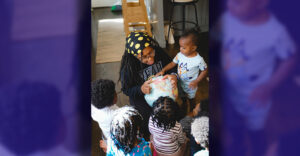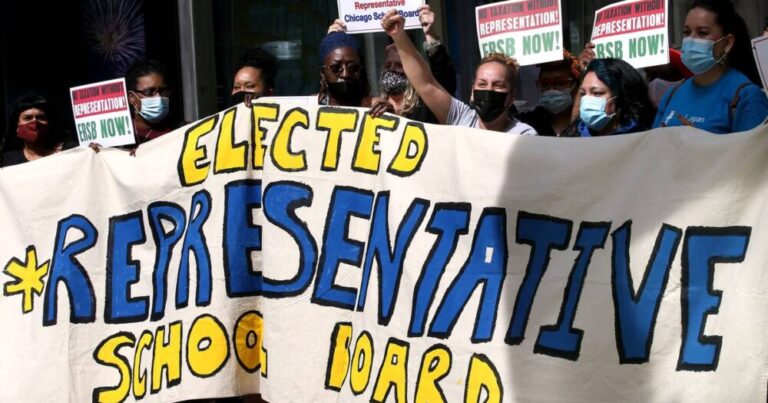A special committee of the Illinois Senate on Monday evening heard an array of perspectives from the public during the final hearing on the logistics of an elected school board in Chicago, with ideas ranging from reducing the number of seats on the board to providing compensation to those who sit on it.
The state legislature is facing a July 1 deadline to draw boundaries for the Chicago Public Schools’ school board districts in preparation for a partially elected board in 2025 and a fully-elected, 21-member board in 2027.
“An elected school board will provide our communities with greater accountability, a way to hold CPS leaders responsible for the decisions that impact our children and our neighborhoods,” state Sen. Omar Aquino, a Chicago Democrat who was educated in CPS, said during Monday’s virtual hearing.
“Our neighborhood schools are facing incredible challenges,” said state Sen. Robert Martwick, also a Chicago Democrat, who was the main Senate sponsor for the legislation that created the elected school board. “During these hearings we’ve heard about the need to increase violence prevention initiatives and improve transportation. We’ve heard about facilities that need to be repaired and expanded, and we’ve heard about calls to address long-standing inequalities and how resources are allocated.”
Brent Hamlet, a middle school program manager at a nonprofit group called Horizons for Youth, requested that the legislature reduce the number of school board members.
“More board members does not mean more effective. It just means it will be more expensive to run,” he said. “An unusually large school board will create more unnecessary bureaucratic waste, taking funding from schools to provide resources for board members. Now, why would we spend millions of dollars that could otherwise be invested in our students?”
Miriam Bhimani, who represents a data-gathering group that researches public education, said the districts should have a “substantially equal number of CPS-attending children residing in the district.”
“Students who attend Chicago Public Schools are not equally distributed across the city,” she said. “It is extremely typical for students to travel outside their neighborhoods for school. Their experiences should be reflected across the mapped districts.”
Jeff Jenkins, who has served on a local school council for a Chicago elementary school, was adamant that the legislature see to it that the elected citywide school board members get paid. Under the current plan, the board seats are unpaid positions.
“We are going to limit the amount of people and the quality of people who can run, and it’d be similar to the appointed boards that we have been working to replace for decades where it’s people of means — CEOs, high-wealth individuals, those are the only people who can volunteer that kind of time,” Jenkins said.
The legislation to allow for an elected school board passed through the General Assembly in 2021 over Mayor Lori Lightfoot’s objections. The measure included an immediate moratorium on school closings until 2025. That’s when a “hybrid” board — with half of the members elected and the others, in addition to the president, appointed by the mayor — would be implemented before a fully elected, 21-member school board is in place in January 2027.
Starting Jan 15, 2025, the hybrid board will consist of 10 elected members serving four-year terms, 10 appointees serving two-year terms and a board president appointed by the mayor to a two-year term.
Lightfoot initially supported an elected school board during her 2019 mayoral campaign, but backtracked and later pushed for a hybrid panel.
“The bill creates the nation’s largest elected school board by more than double,” she wrote in a letter to Gov. J.B. Pritzker in August 2021, expressing her concerns about an elected school board in Chicago. “Even Los Angeles, with a larger school population than Chicago’s, only has seven elected members, while (the Illinois legislation) would create an unwieldy 21-member board.”
Over the years, the size of Chicago’s school board has ranged from five to 15 members.
Mayor-elect Brandon Johnson, a former Chicago Teachers Union organizer, will preside over the school district’s final years of mayoral control when he begins his term May 15.
Of Illinois’ more than 800 school districts, Chicago is the only one without an elected school board. That was due to 1995 legislation — backed by then-Republican controlled Springfield — that turned the schools over to then-Mayor Richard M. Daley and a mayoral appointed school board. At that time, the Chicago Public Schools was headed by Paul Vallas, who ran unsuccessfully against Johnson in the April 4 election.
Returning to an elected school board has been debated for years, with some arguing it would allow for more parental and neighborhood input and counter a history of school closures. But legislation has been put on hold by previous mayors largely due to fears of the CTU’s power and influence over an elected panel.
During a panel discussion on Monday with potential Wall Street bond investors, Pritzker called Chicago’s transition to an elected school board “kind of an inevitable change” but he couldn’t say if the new format would have an effect on the state’s funding for the city’s school system.
“I don’t know that will make an enormous difference in how the dollars get spent, although I think people will feel better represented, certainly in that argument, but I know that there’s — it’s always the case, most school districts anyway, feel like they’re not quite funded enough or very underfunded,” Pritzker said.
Chicago Tribune’s Dan Petrella contributed.
jgorner@chicagotribune.com






